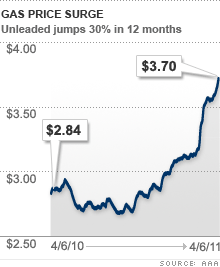2011年的油价大涨之势已近尾声?
|
2011年的油价大涨之势已近尾声? 油价涨涨不休已成常态。国际货币基金组织(IMF)上周宣布,高油价状况将持续,过去10年油价年均涨幅12.5%。华尔街正在孤注一掷于油价的进一步上涨。随着上周四纽约原油价格触及110美元/桶,今年累计涨幅达到17%,这个注看来押得不错。 汽油价格见顶? 但是尽管全球经济增长加之中东石油热点地区动荡,仍有迹象显示油价对于手头紧张的消费者而言早已太高。以美国汽油需求为例,过去四周下降3.7%——能源市场跟踪人士史蒂芬•肖克称之为“实质性下降”。 不过,美国汽油价格本周已触及3.70美元/加仑,创2008年夏季以来新高。英国的汽油零售价格也在飙升,而且由于税收因素,英国汽油的单位加仑价格已接近美国的两倍。而在中国,政府正努力通过压低需求控制大宗商品价格。 但价格上涨和需求下降不可能长期并存,这也是为何一些市场观察人士认为除非有新问题出现——如中东冲突再次升级,否则未来油价将转而下跌的原因。 “当前的市场价格已反映了很多风险和担忧因素,”NUS Consulting驻新泽西州帕克里奇的理查德•索坦尼亚表示,“我们认为当前市场真的不理性,除非我们再次遭遇危机,否则油价必将下跌。” NUS Consulting为企业提供能源价格建议。 那么,如果需求不旺盛,为什么油价会这么高呢?看看华尔街就知道了,那里通过期货和期权赌油价上涨的投机头寸已达到3.23亿桶当量——是Gluskin Sheff经济学家戴维•罗森博格认为的正常值的4倍。 罗森博格认为,只要这些投机头寸减少1/3,降至去年秋季美联储(Federal Reserve)启动二次量化宽松前后的水平,原油价格就可能降至85-90美元/桶。 肖克称,90美元/桶的油价是完全有可能的,毕竟自2010年底油价投机兴起以来,经济基本面几无改观。他将今年油价上涨的大部分原因归于对冲基金和其他交易者利用杠杆、赌大宗商品价格上涨的行为。自从去年8月本•伯南克承诺将以更宽松的货币政策支持美国经济,大宗商品价格展开了一轮飙升。 美联储最新的高级信贷官员调查显示,养老基金、对冲基金等投资者加大了杠杆的使用。 “美联储正在不断地给他们钱,因此,这些人可以赌价格上涨,” 肖克表示,“市场上由此产生的溢价可能为15-20美元。” 索坦尼亚也表示,一旦投机行为不管出于什么原因终止,85-95美元的油价区间看来是有可能的。当然,此轮涨势将如何结束以及何时结束尚不明了,但一个显而易见的事实是高油价持续的时间通常较短,因为高油价会导致经济增长放缓。 他还将今年的油价上涨比作2008年的那轮上涨,当时油价曾短暂上探至147美元/桶。 “我们当时就告诉客户说,更高的油价预测是错误的,”索坦尼亚表示,他的公司为大企业提供油价对冲建议,“我们现在也是这样告诉客户的。” |
Has the great oil rally of 2011 run its course? Rising oil prices have become a fixture. The IMF declared this week that costly oil is here to stay, after a 12.5% average annual price increase over the past decade. Wall Street is betting the ranch on further increases. With crude hitting $110 a barrel in New York Thursday, up 17% this year, it's not looking like a bad bet. Peak gasoline? But for all the talk of global economic growth and unrest in Mideast oil hotspots, there are signs that oil prices are already too high for pinched consumers to bear. U.S. gasoline demand, for instance, dropped 3.7% over the past four weeks -- which energy tracker Stephen Schork calls a "material decline." Yet U.S. gas prices hit $3.70 this week, their highest level since the summer of 2008. Retail prices are also soaring in the U.K., where the per-gallon price is nearly double the one here thanks to taxes, and in China, where the government is trying to get a hold on commodity prices by pushing down demand. But rising prices and falling demand can't co-exist for long, which is why some market watchers argue that oil prices are headed for a fall unless new problems emerge -- such as another flareup in the Middle East. "The market is pricing in a lot of risk and a lot of fear right now," says Richard Soultanian of NUS Consulting in Park Ridge, N.J., which advises companies on energy prices. "What we're looking at right now is really irrational, and unless we get another shock you're going to see the prices come down." So why are prices so high if demand is tepid? Look no further than Wall Street, where speculative bets on rising oil prices via futures and options amount to the equivalent of 323 million barrels -- four times what Gluskin Sheff economist David Rosenberg calls a normal level. He says that simply reducing that position by a third, to levels seen last fall around the start of the Federal Reserve's second quantitative easing program, could bring the crude price down to $85 to $90 a barrel. Schork says $90 oil is entirely plausible, given how little economic fundamentals have changed since the speculative run in oil started at the end of 2010. He attributes much of this year's gains to hedge funds and other traders levering up to bet on commodity prices, which have obliged by surging since Ben Bernanke promised in late August to support the economy with looser money. The Fed's latest senior credit officer survey reported increased use of leverage by investors such as pension funds and hedge funds. "The Fed is giving these guys money so they can bet on prices going up," Schork says. "There is probably a $15 or $20 premium in the market because of it." Soultanian too says a price in the $85-$95 range looks likely once the speculative run ends, for whatever reason. How or when this streak might end isn't clear, obviously, but it's evident that higher oil prices are often short-lived because of the economic slowing they cause. He likens this year's runup to the one in 2008 that briefly took the oil price to $147. "We were telling clients then that the forecasts for even higher prices were wrong," says Soultanian, whose firm advises big companies on oil price hedging. "We're telling them the same thing now."
|














